Al-Zaytouna Centre for Studies and Consultations held a panel discussion titled Impact Assessment of Economic Empowerment and Employment Programs on Palestinian Refugees in Lebanon, on 28/12/2017, at the Beirut Crowne Plaza Hotel. The event was attended by a distinguished group of experts on economic, humanitarian, and charitable projects and refugee issues, focused on Palestinian refugees in Lebanon.
The workshop was divided into four sessions over the course of one day, tackling the political and economic climate and employment programs involving Palestinian refugees in Lebanon. The panelists assessed the experience of Palestinian, Arab, and international groups operating in this area, discussing the real needs of the refugee community, and how to achieve a bigger impact within available means. The panelists tried to come up with a forward-looking vision that would benefit from the impact assessment methodology in this regards, to develop effective employment programs targeting Palestinian refugees in Lebanon that can deliver results.
In his opening, Dr. Mohsen Mohammad Saleh, the general-manager of Al-Zaytouna Centre, thanked the group of active institutions working to help refugees, especially those leading economic empowerment and employment programs in Lebanon, for coming to share their experiences. Saleh said that this issue has not received its due attention despite its importance. For this reason, he continued, it is crucial to assess the experiences of the past few decades whose impact has never been measured or assessed, such as the work of organizations like the United Nations Relief and Works Agency for Palestine Refugees in the Near East (UNRWA) and Palestinian Martyrs Works Society (SAMED). Saleh added that many of these organizations work as isolated “islands” lacking coordination, which leads to duplication of efforts, repetition of mistakes, and often, failure. Saleh raised several questions regarding the real needs of the Palestinian refugee community, and how a greater benefit and impact can be achieved within the available means. Saleh said that the suffering of Palestinians in Lebanon was immense, urging for solutions to be translated into effective programs to mitigate this, especially in relation to denying Palestinian refugees in Lebanon the right to work and own property.
The panelists included:
• Suhail al-Natour, member of the Central Committee of the Democratic Front for the Liberation of Palestine;
• Adib Nehmeh, Regional Adviser to the Economic and Social Commission for Western Asia (ESCWA);
• Bassem Elkassem, researcher at Al-Zaytouna Centre;
• Saqr Abu Fakhr, Director of Editorial Affairs, Beirut Branch of the Arab Center for Research and Policy Studies;
• Mahmud al-Jumaa, coordinator of the National Institution of Social Care and Vocational training (NISCVT) known as Beit Atfal Assumoud (BAS) in Tyre;
• Aminah Jibril, President of the General Union of Palestinian Women, Lebanon Branch;
• Muhammad al-Sahli, Founding Member and CEO of the Iktisaduna company;
• Mohammed Hourani, Deputy Director of the Welfare Association (Taawon);
• Jaber Suleiman, activist and member of the Palestinian Global Coalition for the Right of Return and in the Palestinian Civil Society.
• Edward Kattoura, political advisor to ARK company;
• Nazih Yacoub, Palestinian program officer at UNICEF,
• Wafa Al-Yassir, former country director of Norwegian People’s Aid.
The panelists addressed the complex relationship between political conditions and economic development in the Palestinian refugee community in Lebanon, overviewing the landscape formed by groups working in the areas of economic development and employment programs on Palestinian refugees in Lebanon. The methodology of impact assessment studies on these projects and applications in the context of Palestinian refugees in Lebanon were discussed, with a view to ensure they have economic and developmental results. The panelists said the effectiveness of the projects is measured based on technical inputs and outputs, while medium to long-term results and impacts are often ignored. The panelists agreed that a fundamental condition to achieve economic empowerment and employment is genuinely improving the situation of targeted segments without relying on further aid. They added that employment does not mean that a job opportunity by itself may fulfil empowerment, rather, income should lead to social protection, and work opportunities should conform to decent work standards.
During the workshop, a number of economic initiatives and projects targeting Palestinian refugees in Lebanon were also overviewed, with a focus on their experiences and lessons learned. Several working papers detailed the activities of relevant organizations that have had an economic impact on the community. The panelists assessed the impact of employment projects on the conditions of Palestinian refugees in Lebanon, especially women and youths, identifying successes and shortcomings and their causes, with a view to enhancing coordination and exchange of knowledge and experience among the parties concerned with the employment of refugees and developing the necessary mechanisms for achieving this goal. The speakers made recommendations on how to build a vision for the work of the developmental and employment groups in the Palestinian refugee community in Lebanon, and how to benefit from the impact assessment methodology of the development and employment groups working with refugees.
The participants stressed the importance of cooperation and coordination among all actors in the field of “economic empowerment” in order to reach and assist as many Palestinian refugees as possible. It will also prevent repeating mistakes, and help all actors to focus on empowerment and development projects.
Some suggestions were also made by the participants: including developing an approved database on the reality and needs of Palestinian refugees; conducting a study to identify the needs of the Lebanese labor market to guide youth to specialize in areas that cover these needs, and guide grants and loans in this direction; focusing on the priorities and requirements of the Palestinians in Lebanon; seeking better Palestinian planning for the use of aid, whether local or Arab, but especially foreign aid in the interest of the Palestinian public; linking institutions and projects to Palestinian national goals, particularly with regard to reducing the migration of young Palestinians; and avoiding the separation of economic empowerment and social empowerment.
At the conclusion of the panel discussion, Dr. Saleh thanked the participants for their contribution, stressing that the topic and ideas discussed in the panel were vital and useful, and that the working papers were of high value, for launching an important discussion and highlighting key issues worth follow-up. Saleh said Al-Zaytouna Centre would seek to develop the panel papers into full research papers.
Al-Zaytouna Centre for Studies and Consultations, 2/1/2018
| Reception and opening | 9:00 | 9:30 | ||
| First session : Introduction to impact assessment |
9:30 | 11:10 | First Session moderator | Marwan Abdel Aal |
| The relationship between the political situation and economic development in the Palestinian refugee community in Lebanon | Suhail al-Natour | |||
| Overview of organizations working in the field of economic development and employment projects for Palestinian refugees in Lebanon | Bassem Qassem | |||
| Methodology of impact assessment studies for economic and employment projects, and its applications to Palestinian refugees in Lebanon | Adib Nehmeh | |||
| First break | 11:10 | 11:30 | Break | |
| Second Session: Palestinian experiences |
11:30 | 13:00 | Second Session moderator | Adib Nehmeh |
| SAMED Foundation | Saqr Abu Fakhr | |||
| Beit Atfal Assumoud | Mahmud al-Jumaa | |||
| General Union of Palestinian Women | Aminah Jibril | |||
| Welfare Association (Taawon) | Mohamed Hourani | |||
| Iktisaduna | Mohammed al-Sahli | |||
| Second Break | 13:00 | 13:30 | Break | |
| Third Sessions: Arab and international experiences |
13:30 | 15:00 | Third Session moderator | Dr. Nahla Chahal |
| UNRWA | Jaber Suleiman | |||
| ARK Company | Edward Kattoura | |||
| UNICEF | Nazih Yacoub | |||
| Norwegian People’s Aid | Wafaa al-Yassir | |||
| Third Break | 15:00 | 15:45 | Break and lunch | |
| Fourth Session: Vision for the future |
15:45 | 17:15 | Fourth Session moderator | Munthir Zaidan |
| Open dialogue: Future vision for the work of development and employment organizations in the Palestinian refugee community in Lebanon | ||||
| Closing Speech | 17:15 | 17:30 | Dr. Mohsen Mohammad Saleh | |



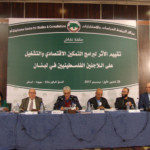
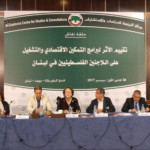
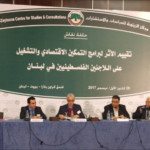
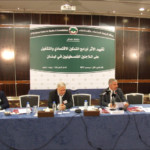
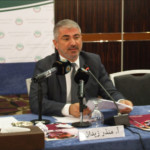
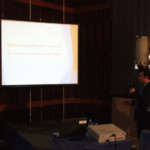
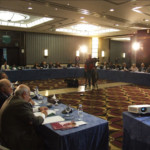
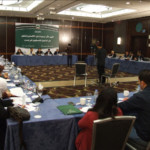

Leave A Comment